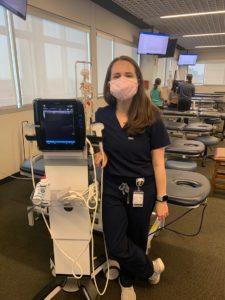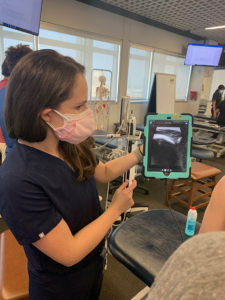TCOM students learning key Ultrasound technology, but also teaching it themselves
 Louisa Weindruch saw what it could do in an emergency room. Cassidy Weeks recognized its value to rural health care. That’s why both students are striving to learn all they can about the emerging use of ultrasound technology to diagnose disease and potentially save patients’ lives.
Louisa Weindruch saw what it could do in an emergency room. Cassidy Weeks recognized its value to rural health care. That’s why both students are striving to learn all they can about the emerging use of ultrasound technology to diagnose disease and potentially save patients’ lives.
The pair of second-year Texas College of Osteopathic Medical students recently completed a study on the teaching technique that is fundamentally expediting the learning curve for students using ultrasound. The technique is called “near peer teaching”.
They presented their findings to a prominent audience at the RTT Collaborative National Conference on April 9.
“I think it made for a better learning environment because your classmates are more willing to fail in front of you, a classmate, instead of an instructor,” Weeks said. “Ultrasound is such a hands-on skill, so what we saw was students are willing to try and test out the ultrasound in many ways with the TA’s (teaching assistants) and students to help guide them.”
TCOM has been weaving the Ultrasound technology into its curriculum over the last few years. Weindruch was already a believer before she arrived at medical school.
“I actually became interested in Ultrasound when I was an emergency room scribe,” Weindruch said. “I saw how useful ultrasound was and when I got to TCOM in our first year they started to implement it just a little into our learning. I wanted to get better at it myself and, the more time I spent doing it, the better I got.”
Near peer teaching is when material is taught to students by their peers, which students utilized in the ultrasound curriculum at TCOM. Point of care ultrasound is incorporated into the Year 1 Physical Exam and Year 2 Simulation Lab. In both settings, Ultrasound Teaching Assistants, a group of second-year students who have attended additional training and practice sessions, lead instruction.
 TCOM’s Assistant Dean for the Office of Rural Education Dr. John Gibson, who is developing the curriculum for the ultrasound, realized early on that he might have to approach it differently.
TCOM’s Assistant Dean for the Office of Rural Education Dr. John Gibson, who is developing the curriculum for the ultrasound, realized early on that he might have to approach it differently.
“It was really an invention born of necessity,” Gibson said. “We only had a few faculty that were good at teaching ultrasound, so I knew I had to come up with something different.”
TCOM’s Class of 2023 took immediate interest in near peer teaching and, when Dr. Gibson started to offer extra training for TA’s and interested students, over 30 students showed up.
“The biggest thing about near peer teaching is it’s very low stress,” Weindruch said. “It’s a little intimidating with a hands-on skill when you have a physician who’s been doing it for 40 years looking over your shoulder. When it’s just us (students), we can laugh about making mistakes and it’s more casual and you’re not nervous about the little things.”
The results speak for themselves. A survey showed that 71 percent of the students say near peer teaching benefited them and 100 percent of TAs surveyed said it was beneficial for them.
“I think that one of the most interesting takeaways from it was it taught them more and it fostered their interest to be better at ultrasound,” Weeks said. “TAs and students both said that it benefitted them personally.”
Near peer teaching and ultrasound itself has taken off with TCOM students. The Class of 2024 had nearly 80 people showing up for extra training as the students see the long-term benefits to the technology. Weeks and Weindruch both plan to take this skill with them into the clinic when they graduate. Weindruch is pondering a specialty of Emergency Medicine or Pediatric Emergency Medicine, where ultrasound could save lives in a matter of minutes.
Weeks is planning to practice family medicine in a rural setting, where Ultrasound can be a difference maker.
Near peer teaching wasn’t the only success. The presentation by Weeks and Weindruch was so successful it received praise from the President of the RTT Conference.
“It’s becoming a prominent staple in primary care and it’s stemming from the rural setting,” Weeks said. “It can help you in a rural setting before you refer anyone to a specialist or an ER, but it’s also inexpensive and has fewer complications. Ultrasound has a great ability to level the playing field for those patients who have a hard time getting access to health care.”
“It’s huge, taking ultrasound to rural health,” Dr. Gibson said. “This has been very inspiring to the students and for the pre-clinical students they can already start learning how to do preventative health care.”



![Uyen Sa Nguyen Scaled[58]](https://www.unthsc.edu/newsroom/wp-content/uploads/sites/16/Uyen-Sa-Nguyen-scaled58-145x175.jpg)

Social media